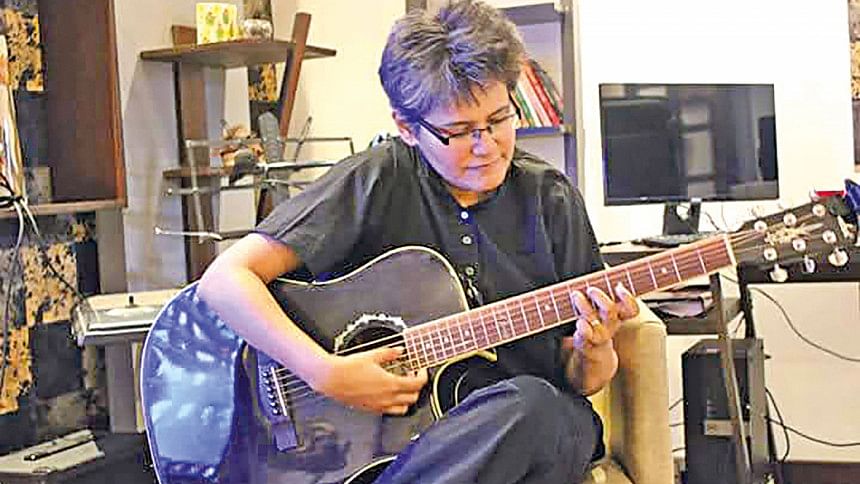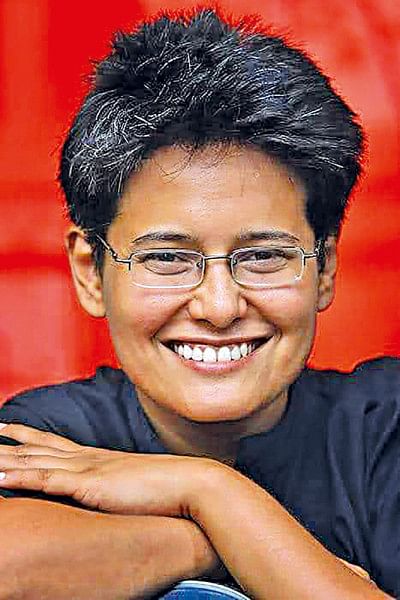A Melodious Weapon

Rafi Hossain: Welcome to Uncensored with Rafi Hossain. Today, we are here with Farzana Wahid Shayan, a well-known figure in the music industry. Shayan, I want to know how you classify or define your songs.
Farzana Wahid Shayan: Songs that are written in the sphere outside of nature, love and prayer are generally, categorised under Jibonmukhi songs. I consider Jibonmukhi songs as songs that keep me at one with my life because I am someone who celebrates life.
Rafi: Do you think these songs play a special role in motivating and resonating within listeners more than songs of other genres?
Shayan: I don't necessarily agree with that. Songs about movement or revolution will resonate with people who want to see such. However, there is also a world outside that – a world of emotions. Songs that deal with emotions are just as important, I believe. So, it ultimately depends on individual preference that decides which kinds of songs will resonate more with the listeners.
Rafi: Who were your inspirations?
Shayan: Shahnaz Rahmatullah is one of my biggest inspirations in music. I hold her in a special place in my heart. When I was learning the ropes of music, I practised her songs. I feel that they display so much more than vocal expertise. She pours her emotions into every single song. I hold her music above all music in the world. During my longer shows, I make sure to perform her songs. I also love to sing them in front of my close friends and family.
Rafi: How did you develop an interest in the kind of songs you sing?
Shayan: When I started writing my own music, I began learning the nuances of life, the facets of society, and I found myself diving into a world of music where I had the freedom to talk about whatever I wanted. I was inspired by the works of Rabindranath Tagore, among others.
Rafi: How does it feel when your listeners appreciate your music?
Shayan: When someone comes to me and tells me that a certain lyric of my song struck a chord in them or spoke to them, it makes me incredibly happy. No matter how many times I hear such things, I can never stop myself feeling a sense of pride. I consider this to be a huge achievement and validation. It encourages me to go forward. If I wasn't able to tug at the heartstrings of my listeners, I wouldn't have been as content in my career as I am now.
Rafi: Your family birthed three incredible musicians: Ferdous Wahid, Habib Wahid and you. Do you perform songs when you are together?
Shayan: I grew up listening to and revering Ferdous Wahid. Having a well-known person like him as a member of the family was something of pride. As for Habib, I think he has made a unique musical sound, and I'm incredibly proud of him for that. When we are together, we talk more about music than actually performing. During gatherings or special events, three of us perform together along with other family members who practise music.

Rafi: So many horrible things are happening in society right now. How do you use music as an instrument to talk about these?
Shayan: We all have different ways to react to situations, and for me, it is music. We see so much injustice everywhere, and although me creating a song referring to them won't change or exterminate them from society, it will help me feel a little better. If I can share this sentiment with similar minded people, we can create a voice.
Rafi: Why do you think such injustices are taking place? What can we do to stop them?
Shayan: In our culture, women are extremely tolerant. It is seen as a virtue. However, under this guise, they are mistreated in ways, not just physical. Still, they are told to keep tolerating those in silence. As a woman, I have seen the realities of the injustices faced in this society. Although women have been able to take themselves to a place where they hadn't been a few hundred years ago, there are still some oppressive practices that have prevailed through time. There isn't one solution to this. We have to punish some people, educate women on their rights, teach children about these things, stop the regressive practices that we still have and remove the taboo on certain topics and discuss them at length. Through media, we can express ourselves more freely. As I can't participate in the protests in Dhaka, I have protested in my own way in Toronto for seven days by posting works of mine relating to such topics. When a pressure is created by society like this, then only will the laws change in favour of us. If we don't raise our voices and protest, these injustices will continue to exist. In this way, I hope that we'll be able to create a society where women are safe and respected.
Rafi: You do not live your life following the stereotypes of how women should live or present themselves according to society. Can you talk a little about that?
Shayan: There is this idea of how a woman should look and carry herself, and I do not align with it. Do I have to wear a saree to be a woman? I do love sarees, just not for myself. I have been told many times in my life that I can't be called a complete woman because of my attire or presentation. However, I'm free to wear whatever I choose; it doesn't make me less of a woman. If a man decides to wear a saree, it doesn't make him any less of a man. We have the right to exercise our freedom. Society tends to shun people who steer away from these gender norms, but this is who I am, and I want to be accepted for that. We have made this society, so we have to make sure that it doesn't become an obstacle for us to completely express ourselves.
Rafi: If we're talking about Bangla culture, where do you think we are headed?
Shayan: There is no certainty in where we are headed, but from what I see, we are headed towards wherever we take ourselves. I hope that we can head in a direction where individuals and their ideas are respected. When making any artistic piece, I hope that we can sway from creating things which have the sole purpose of being commercial because we are better than that. We should aspire to create things with meaning. We are capable of leaving a mark, so we should make something worthwhile to be remembered with. If we all try, we can surely achieve this.
Rafi: Even though there are many talented individuals, we don't see many works like you have suggested. How can we overcome this?
Shayan: I can't speak for everybody as everyone has their own needs. Sometimes, breaking the commercial route means risking their finances. So, artists fall in this predicament of deciding what to prioritise. I think that the risk should be taken because it is the duty of artists to create something worthwhile. Many literary figures we know of have gone through a lot of hardships, but their works are still very much known and revered. Not everyone wants to follow the same path as them, but I think it is the only way. I can't say much about how we can overcome this, but if we want to do so, we must walk the difficult path. I won't tell everyone to steer completely away from anything commercial since we all have to sustain ourselves, but we do have to take risks.
Rafi: Do you have any final message?
Shayan: Thank you so much for having me here today. Thank you to everyone for supporting me. I make songs with a purpose, whether it be for my personal fulfilment or a part of the bigger picture. I make music for a better society. If my songs resonate with one person, that is still an achievement as they are a part of the society. Even if it a small achievement, I value it a lot. I would encourage everyone to live freely and be vocal about things, so that we can live with dignity and grace.
Rafi: Thank you for being here with us today.

 For all latest news, follow The Daily Star's Google News channel.
For all latest news, follow The Daily Star's Google News channel. 



Comments